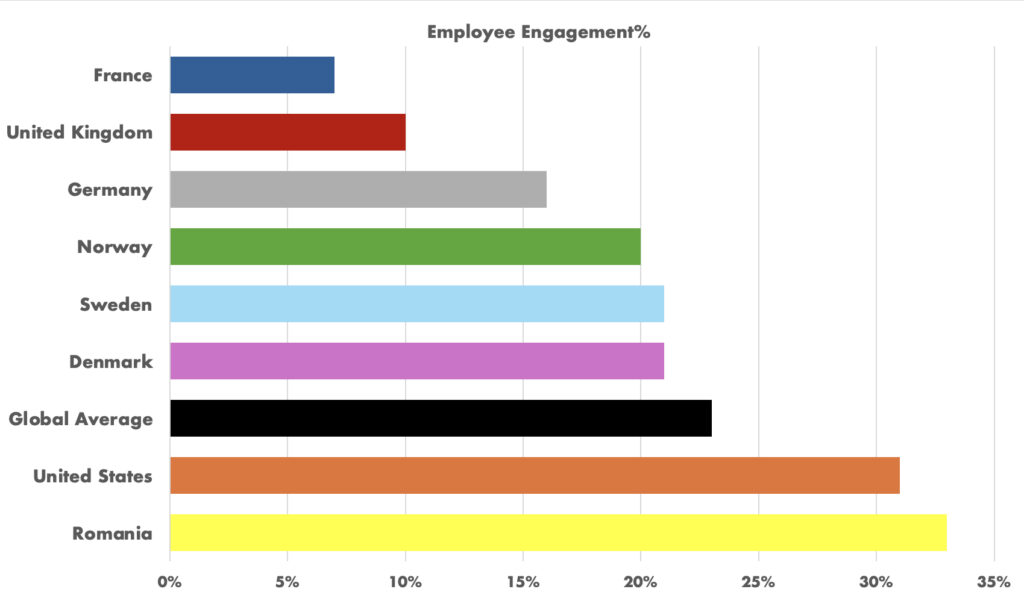In today’s fast-paced and competitive business environment, employee engagement is more than just a buzzword—it’s a key driver of productivity, profitability, and long-term business success. The UK, unfortunately, lags behind in this area compared to other countries, and this has significant implications not only for individual businesses but also for the wider economy. However, with the right strategies, we can turn this around.
UK Employee Engagement: A Comparison
According to Gallup’s 2024 State of the Global Workplace Report, only 10% of UK employees are engaged in their work, ranking the UK 33rd out of 38 European countries. This is stark compared to the 31% employee engagement rate in the United States and 23% globally. Closer to home, countries like Romania (33%) and Denmark (21%) show that higher engagement levels are possible even within Europe .
Despite these low figures, this isn’t a story of doom and gloom. Instead, it highlights the opportunity for UK businesses to enhance their performance by focusing on improving employee engagement. Research shows that businesses with highly engaged employees experience a 23% increase in profitability and a 78% reduction in absenteeism.
Why Employee Engagement Matters
Engaged employees aren’t just happier—they are more productive, innovative, and committed to their organisation’s success. When employees feel connected to their work, they are more likely to go above and beyond, which leads to higher customer satisfaction, better business outcomes, and ultimately, greater profits.
In the UK, where employee engagement is lagging, businesses are missing out on these significant benefits. Disengaged employees cost companies millions in lost productivity and increased turnover. The cost of replacing an employee is estimated at around £30,000 per hire. When employees leave, businesses not only lose productivity but also incur the costs of hiring and training new staff.
A Global Perspective: What Other Countries Are Doing Right

Countries like Romania and the United States have shown that higher levels of engagement are achievable. What’s working for them? A few key elements stand out:
- Recognition and Reward: Employees in highly engaged workplaces feel their contributions are valued. Regular recognition boosts morale and encourages a sense of ownership over their work.
- Work-Life Balance: Many countries with higher engagement scores also offer flexible work arrangements that allow employees to better manage personal and professional responsibilities.
- Leadership and Communication: Trust in leadership plays a significant role. Countries with better engagement rates tend to have leaders who prioritise communication and actively seek to understand and meet employee needs.
The Way Forward: Improving UK Employee Engagement
Increasing employee engagement in the UK is not only possible—it’s necessary for the future of our economy. By investing in engagement, businesses can boost productivity, boost profits, and contribute to the economic recovery we so desperately need.
Here are some actionable steps UK businesses can take:
- Prioritise Employee Wellbeing: Start by understanding what your employees need to thrive. Whether it’s flexible working, mental health support, or career development, meeting these needs will boost morale and engagement.
- Build a Culture of Recognition: Recognition doesn’t have to be expensive or elaborate. Simply acknowledging good work regularly can have a huge impact on employee satisfaction and engagement.
- Develop Leadership Skills: Training managers to be effective, communicative leaders who can inspire their teams is critical. 70% of the variance in team engagement is attributed to the manager’s effectiveness .
- Encourage Continuous Development: Offering opportunities for professional growth is a powerful motivator. Employees who feel they are learning and advancing are more likely to stay engaged and committed.
The Bigger Picture: Business Success Leads to Economic Growth
Engaged employees don’t just benefit businesses—they benefit the entire economy. By improving engagement and boosting productivity, businesses contribute more to the economy in the form of profits, which means more tax revenue.
Here’s how it works: More productive employees lead to higher profits, which increases corporate tax contributions. Furthermore, engaged employees are less likely to leave, reducing the costs of turnover and allowing companies to reinvest in growth, innovation, and employee development.
In essence, by focusing on improving employee engagement, UK businesses can play a critical role in strengthening the economy—without the need for toxic positivity. It’s not going to be easy, and it’s not a quick fix. But the benefits—higher productivity, profitability, and a more robust economy—are worth the effort.
Action Point: Review “The Way Forward” above and choose what action you’ll take in your business in the coming months to measure employee engagement, improve it, and reap the benefits.





